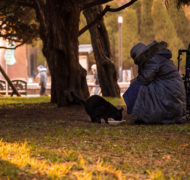Best of Daily Reflections: Do You Build Fences or Dig Wells?
Daily Reflection / Produced by The High Calling
There is no fear in love, but perfect love casts out fear; for fear has to do with punishment, and whoever fears has not reached perfection in love. We love because he first loved us.
1 John 4:7-21
Love is God’s instrument for binding the world together. There are also other attempts to accomplish this task. Some will try hate to unite people. Some will use fear. Both will work for a season or two. So will suffering and need. But love has enduring power. In contrast, sooner or later hate becomes self-destructive. And the causes of fear, suffering, and need eventually either resolve themselves or fragment into self-interest. But love never ends.
The ranchlands in Australia are so arid that it takes many acres to supply each cow with enough food to survive. So the cattle ranches are not measured in square acres but in square miles. In that far flung environment, fences are impractical. So how does the rancher keep track of the cows? The answer is water wells. As long as fresh water keeps rising from the wells, you never have to worry about where the cows are. Sooner or later, they’ll come back to the well because the well gives life.
In this little letter, John returns over and over to the subject of God’s love and our duty to love as we have been loved. This love wells up from God’s inexhaustible core. Unfortunately, we often reduce God to the character of a ranch hand whose main interest is setting and maintaining fences that determine who’s right and who's wrong, good and bad, in or out.
But in John’s letter, God’s activities hardly sound like fence-tending. Using seven examples, John reminds us that God’s love is the agent that gives us life, pays for our rebellion, intimately abides within us, perfects us, stirs up a spirit of boldness within us, releases us from fear, and sends us out as missionaries of love. Seven examples and not one sounds like tending fences. The more of these qualities we share with others, the more tightly we are bound to each other.
Binding agents hold things together: eggs in cooking, cement in concrete, tie beams in timber framing, wax in paint, straw in clay for bricks, and clay in straw for insulation, and all sorts of binding agents in pills. But the greatest of these is love.
Love is God’s supreme binding agent. Love in any quantity counts. Even if you can’t love a lot, at least love a little, and little by little God will free you from fear and hatred and even death.
LECTIONARY PASSAGE:
Beloved, let us love one another, because love is from God; everyone who loves is born of God and knows God. Whoever does not love does not know God, for God is love. God’s love was revealed among us in this way: God sent his only Son into the world so that we might live through him. In this is love, not that we loved God but that he loved us and sent his Son to be the atoning sacrifice for our sins. Beloved, since God loved us so much, we also ought to love one another. No one has ever seen God; if we love one another, God lives in us, and his love is perfected in us.
By this we know that we abide in him and he in us, because he has given us of his Spirit. And we have seen and do testify that the Father has sent his Son as the Savior of the world. God abides in those who confess that Jesus is the Son of God, and they abide in God. So we have known and believe the love that God has for us.
God is love, and those who abide in love abide in God, and God abides in them. Love has been perfected among us in this: that we may have boldness on the day of judgment, because as he is, so are we in this world. There is no fear in love, but perfect love casts out fear; for fear has to do with punishment, and whoever fears has not reached perfection in love. We love because he first loved us. Those who say, ‘I love God’, and hate their brothers or sisters are liars; for those who do not love a brother or sister whom they have seen, cannot love God whom they have not seen. The commandment we have from him is this: those who love God must love their brothers and sisters also.
1 John 4:7-21
QUESTIONS FOR FURTHER REFLECTION: What issues and situations tend to set you against other people? What’s your usual response (let things be, attack the problem, etc.)? How do you respond to the idea that God is more interested in digging wells than building fences?
PRAYER: Eternal God, Author and Sustainer of life, it is by your design that love holds history together. I confess to being slow to grasp the full dimensions of your love. My own sin blinds me to your love, and my fears deafen me. And so I come now to the deep well of your love. Thank you for welcoming me with such open arms. Amen.











